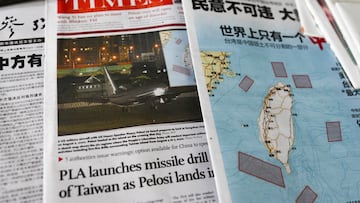Pelosi in Taiwan: What is the position of the US government on whether or not Taiwan is part of China?
Nancy Pelosi has defied Beijing and members of her own party at home by visiting Taiwan. What is the US position?


In order to have diplomatic relations with China, foreign countries must accept the country’s One China Policy or Principle.
After the revolution that led to the creation of the People’s Republic of China (PRC), many top officials from the Taiwan, known officially as the Republic of China. The PRC and the US does not see Taiwan as an independent country. China, and the US in order to maintain a relationship, advocate a “one country, two systems approach” that would allow Taiwan to retain some of its autonomy.
The current governing party of Taiwan is Democratic Progressive Party, a centrist political project to counter the right-wing Chinese Nationalist Party, which emerged in 1986. Both parties support Taiwanese independence, and the United States has long said that while it can agree to the One China Principle, it will not accept violence or aggression towards Taiwan during any sort of unificatory plans by Mainland China.
Nancy Pelosi, who has long opposed the Chinese Communist Party, defied warnings from Beijing and President Biden’s administration and chose to visit Taiwan this week. The Speaker of the House will meet with Taiwanese leaders and voice her continued support for their autonomy and democracy.
The Chinese Ministry of Foreign Affairs warned that if Speaker Pelosi went through with her planned trip, the Chinese government would “take strong and resolute measures to protect [their] sovereignty and security interests.”
Additionally, Chinese Foreign Ministry Spokesperson Hua Chunying reminded the press that in 1979 when the US and China established diplomatic relations, the US recognized “the People’s Republic of China as the sole legal government of China.”
The Ministry does acknowledge that “within that context, the people of the US” can and do maintain “cultural, commercial, and other unofficial relations with the people of Taiwan.” The nature of these relations has driven a division between the US and the PCR, leading us to the current conflict.
For the Chinese government, Speaker Pelosi’s trip does not constitute actions under an “unofficial relationship” or visit, because Beijing did not approve it. For Beijing it is as if President Xi visited a US state or territory without informing the US State Department. Therefore, the trip is seen as a direct provocation.
The visit by the US Speaker comes at a time when tensions are high after the US State Department approved the potential sale of military weapons and technology to Taiwan, valued at over $108 million, according to Reuters. This would only be a fraction of the total military aid sent to Taiwan over the last forty years.
A brief history between the PRC, the US, and Taiwan
Under the Taiwan Relations Act (TRA), passed shortly after diplomatic relations with the Chinese Communist Party were established, the US is required to provide military assistance to Taiwan, a fact that the PRC has always opposed. This does not mean, however, that the US is required to provide direct military aid if China attacks Taiwan.
After the passage of the TRA, under President Ronald Regan, six assurances, that are not legally binding, were offered by Congress clarify the diplomatic relation between Taiwan and the United States. These assurances were passed by Congress in 2016 and included a line on the House and Senate “acted swiftly to reaffirm the United States–Taiwan relationship with the enactment of the Taiwan Relations Act (Public Law 96–8) just 100 days” after formal diplomatic relations were cut off which ensured that the “United States maintained a robust and enduring relationship with Taiwan.” While not legally binding, the assurances have been accepted as the formal requirements of US policy towards Taiwan by administrations of different parties since the TRA was passed.
With respect to the Six Assurances, Spokesperson Hua Chunying said that they were “unilaterally concocted” and that they have “never been recognized and have been firmly opposed to by China.”
“The US has also gone against its commitment of maintaining non-official ties with the Taiwan region.”
Related stories
In an attempt to put out diplomatic fires, NSC Coordinator for Strategic Communications John Kirby said that the US does not support Taiwan’s independence or “any unilateral changes to the status quo from either side.” It is important to note, however, that China has voiced opposition to the status quo and has clarified how they will interpret the visit, which they see as a violation of the status quo and the US commitment to the One China Policy.
While the US interprets the trip by Speaker Pelosi as the status quo, China says it is as if the US told them that “I [the US] can make provocations against you [PCR] as I please, but you [PCR] cannot reject them or act in self-defense.” These comments do not bode well for the US as they await China’s response, for which little is known and could occur soon or within the coming weeks or months. Security experts expected an increased number of military drills to occur within the Strait of Taiwan and possible cyber-attacks on US companies or the government.